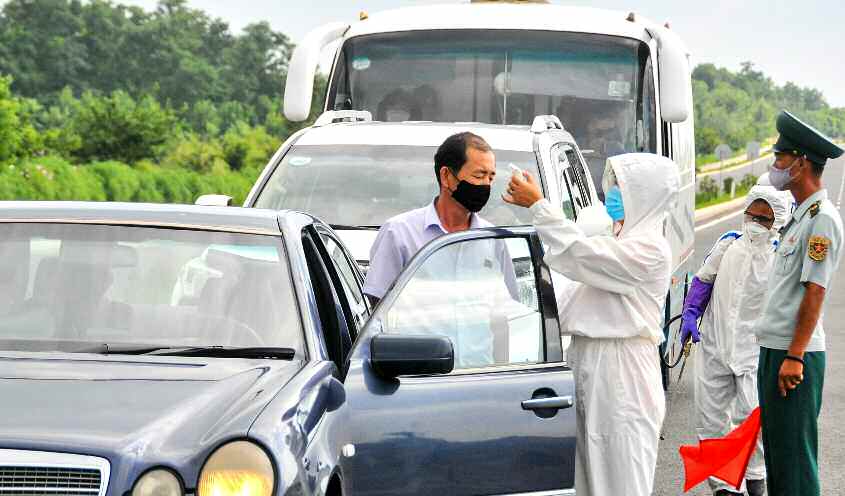As the number of people put into quarantine with symptoms similar to those caused by COVID-19 has skyrocketed in North Korea, a source in the country told Daily NK that people at quarantine facilities confront “terrible circumstances.” Not only can they not get proper treatment due to the lack of basic medications, but there are even cases of quarantined individuals dying of malnutrition because of meager supplies of food and drinking water.
According to a Daily NK source in North Korea on Tuesday, there were nine civilian quarantine facilities where people suspected of having been infected with COVID-19 are isolated spread throughout the country in Hwanghae Province, Pyongan Province, North Hamgyong Province, South Hamgyong Province, Yanggang Province, Chagang Province, Gangwon Province, Nampo and Rason.
In Pyongyang, too, the number of people with coronavirus symptoms is continuously climbing, but individuals from the city are sent to the Pyongan Province facility based on the Workers’ Party policy that an infectious disease facility should not be placed in the so-called “capital of the revolution.”
The provincial anti-epidemic committees and quarantine centers directly operate the facilities under the reported oversight of the Central Anti-epidemic Committee.
However, the source said the quarantine facilities only isolate individuals. They do not provide diagnoses or treatments.
“Firstly, they don’t even have basic medicines,” said the source, who spoke on condition of anonymity. “Even if there are doctors, they are too few compared to the number of quarantined people, so they can’t check the condition of each individual.” After being admitted, only those with serious symptoms are proscribed fever reducers or pain medicine. Most people do not receive medicine, even if they display symptoms.
Moreover, within the facilities, the words “coronavirus” or “infectious disease” must “never be uttered.” “People don’t say the word ‘coronavirus,’” said the source. “The thought that it could be an infectious disease is something both doctors and the quarantined individuals keep to themselves.”
However, what the quarantined suffer from more are hunger and the cold. Three meals are provided at the facilities, but they consist of only rice mixed with corn and salt broth.
Because almost no side dishes are provided, people subsisting on the meals only often suffer from malnutrition. Because of this, there are many cases in which people suffering from a mere fever prior to isolation get sick and die after being put in the facilities.
People with power or money, however, can bribe facility administrators to receive saline IVs or they can eat food sent by their families.
This is just a privilege for the powerful with the wherewithal to offer bribes. Ordinary people are left neglected in the facilities, unable to contact their families or receive special food.
Moreover, the isolated complain of severe cold since 70% sleep on the floor due to lack of beds, yet there is no heating. The source also claimed that they suffer from poor personal hygiene because they are unable to frequently wash due to a lack of hot water.
“In fact, the authorities provide nothing to quarantined individuals, but quarantined individuals have to strictly follow the rules,” said the source. “Not only are they absolutely forbidden to have meetings with their families, but they must also have their temperature taken five times a day and follow the demands of the doctors, doctors-in-training, and nurses.”
Another particular rule those quarantined must follow is that their families must procure their medication. “Doctors give prescriptions, but the medicine isn’t prepared or provided within the facilities,” said the source. “Families have to buy and send the medicine themselves, something only households with money can do.” This reveals the severity of North Korea’s lack of medication.
The complete ban on family visits is due to concerns COVID-19 could spread via quarantined people, but the measure is also largely to prevent the outside from learning of the conditions within the facilities.

For this reason, the authorities are ensuring that documents produced within the facilities do not leak to the outside world, which means that quarantined individuals may not send letters to their families. It is possible to send verbal messages, but nothing in written form is allowed to leave the facilities.
In this situation, even if serious human rights abuses take place in the facilities, they are naturally covered up since contact with the outside has been severed.
In the case of deaths in the facilities, the bodies are cremated and the remains simply returned to the families with no explanation. “If they fail to recover and die, their ashes are simply placed in an envelope and sent to their families,” said the source. “There’s no way to confirm whether the ashes are those of their relative or those of another person.”
“There are people who die with no friends or family, and we don’t know where those people are buried,” said the source. “It’s even possible that people with family who have disappeared without a trace are people who died in the quarantine facilities.”
Meanwhile, according to the World Health Organization’s weekly report on COVID-19 announced on Tuesday, 6,173 suspected cases of COVID-19 were detected in North Korea as of Oct. 29. This was an increase of 805 from a week earlier, when the number was 5,368, but the North Korean authorities have yet to report even a single confirmed case.
Please direct any comments or questions about this article to dailynkenglish@uni-media.net.


















